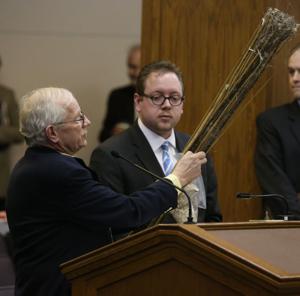Source: roanoke.com

Jim Politis (left) displays hemp stalks during a
General Assembly hearing earlier this year as Del.
Joseph Yost, R-Pearisburg, looks on.
Virginia Tech researchers applied this week for a state license to join the first wave of farmers and scientists who want to relearn the intricacies of hemp cultivation.
“Even though there is a history of growing it, to us, it’s new,” said Saied Mostaghimi, associate dean of Virginia Tech’s College of Agriculture and Life Sciences.
Tech was one of three universities that had asked for hemp licenses by early Friday afternoon — just ahead of the Virginia Department of Agriculture and Consumer Services’ deadline for applications. Obtaining the licenses to experiment with what has been a banned substance for decades is an attempt to restart an industry with deep ties to the commonwealth.
A 1619 law in the Virginia colony required settlers to grow hemp to make needed rope and fabric. Later, Thomas Jefferson invented equipment to aid in processing hemp fiber.
Last year at an event to mark the writing of the Virginia hemp legislation, its author, Del. Joseph Yost, R-Pearisburg, noted that the first two drafts of the Declaration of Independence were written on hemp paper.
But except for a few years around World War II, when hemp growing was re-started to make rope, the plant long has been outlawed as a type of marijuana. The plants are both strains of cannabis sativa, but hemp has more fiber than the marijuana that is smoked, and less delta-9-tetrahydrocannabinol, or THC, the chemical that produces the marijuana high.
Last year’s federal farm bill opened the door to hemp growing as part of research programs in states that passed enabling legislation.
Mostaghimi said that he has heard substantial interest from farmers interested in growing hemp, but so far Virginia allows cultivation only under university auspices and only by licensed research projects.
The agriculture department is still setting up its licensing process, department communications director Elaine Lidholm said.
While the agriculture department’s role is clear — “We are the guardians of the seeds,” Lidholm said — officials aren’t sure yet how long it will take to review applications and grant licenses.
“The only thing I’ve heard about a timeline is they want to do this quickly,” Lidholm said.
Yost and other hemp backers want Virginia growers to tap into a U.S. market that the Virginia Industrial Hemp Coalition estimated last year at more than $500 million. The plant’s fiber and oil are used in food, mixed with concrete, and turned into medicine, among other uses. Supporters have described a possible economic boon to depressed agricultural communities if processing plants are set up near cultivation areas.
But to get there, researchers have to embark on a rediscovery.
While the crop was grown widely early in Virginia’s history, basic knowledge of how best to raise it has been lost. “If it was documented, it wasn’t kept,” Mostaghimi said Friday.
He admitted some scientific frustration with having to catch up to the growers of a century and more ago — “You’re reinventing the wheel!” he exclaimed.
It is already too late this year to do much hemp-growing outside of greenhouses, Mostaghimi said. But next spring, Tech’s team plans to sow different hemp varieties in test plots — probably at the university’s Kentland Farm in Montgomery County and at the 11 agricultural research and extension sites that the university oversees across Virginia, he said.
After a growing season or so, when researchers have a sense of which varieties do best in which locations, they will begin looking into specific products that might be made with the plant, he said.
Mostaghimi said that he and others at Tech are in contact with researchers at Virginia State University and James Madison University, the other two schools that applied for hemp licenses. Eventually, it may make sense to cooperate.
But for now, Tech’s focus will be on the basics.
“There are lots of unknowns about how you grow hemp — what areas of Virginia, what soils, what types of climate,” Mostaghimi said.
And in today’s world, “whether it’s even economically viable,” he added.
No comments:
Post a Comment